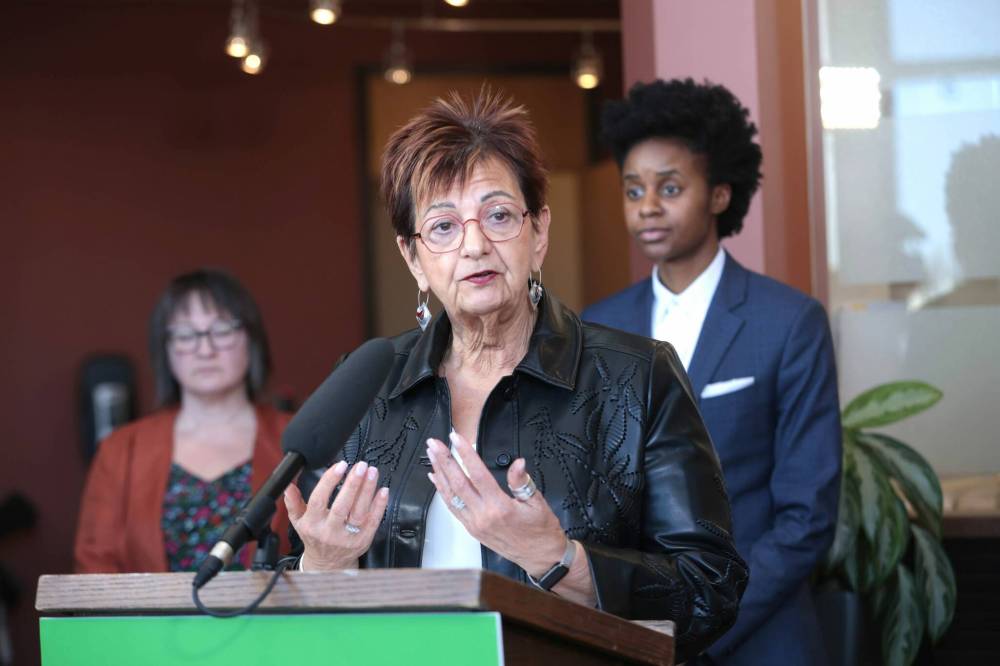Security at the province’s largest hospital complex is significantly higher for University of Manitoba students and staff than it is for nurses who’ve called for increased safety measures amid escalating violence in the ER.
The Manitoba Nurses Union wants to know why some people are better protected than others at Health Sciences Centre in Winnipeg.
“We found that quite surprising,” union president Darlene Jackson said Tuesday, after receiving an arbitration ruling over longstanding safety concerns in and around parking areas at HSC.

RUTH BONNEVILLE / FREE PRESS FILES
MNU president Darlene Jackson wants answers.
Jackson, a former nurse, said she hadn’t yet read it and wouldn’t comment until members get a chance to review the decision.
Security guards — classified as institutional safety officers — employed by the U of M at its Bannatyne Avenue medical sciences campus, carry batons and pepper gel, but guards who work for Shared Health elsewhere in the hospital complex do not.
Legislation that paved the way for the institutional safety officer classification was passed in 2021, expanding the scope of specialized security guards. It allows peace officers to receive training to allow them to carry batons, handcuffs and pepper spray or gel — a thicker substance with a more targeted stream that travels farther than spray and decreases blowback.
The union has been lobbying for the installation of weapons scanners and armed guards in the hospital’s ER following a rash of violent incidents, including the Feb. 22 stabbing of an unarmed security officer.
On March 5, someone who wandered into a staff office area not controlled by swipe cards or keys broke off a paper-cutter blade and then wielded the weapon on the hospital’s main floor.
Before being apprehended by police, the individual used the blade to break through glass on an office door, the nurses union said, citing an incident report.
A dozen institutional safety officers are scheduled to begin working at HSC Monday, with further training in the months ahead, Shared Health said in a statement.
But Jackson said they won’t have the same equipment as the U of M officers.
“They will be using the tools that they have previously been using — which is ‘verbal judo,’ swarming and handcuffs, if necessary,” she said. “Despite the fact that they are training them and calling them ISOs, they are not going to be using the tools under the legislation that allows them to actually act as ISOs.”
Unarmed officers’ de-escalation efforts have been referred to as “verbal judo.”
“Our position is that they need to be using the tools under the legislation,” Jackson said. “I think they believe that what they’re calling verbal judo is adequate to de-escalate. Unfortunately, it’s not.”
Prior to last fall’s election, the NDP criticized the previous Progressive Conservative government for failing to train and hire any institutional safety officers at hospitals or post-secondary school campuses.
Now in opposition, the PCs are calling out the NDP for not arming the officers.
“There are known and documented safety concerns in the HSC ER,” Tory health critic Kathleen Cook said Tuesday.
“I would urge the minister of health to get on the phone with Shared Health ASAP and make sure those ISOs have the tools they need to protect patients and staff.”
Health Minister Uzoma Asagwara said getting the officers trained and in place at HSC is a “top priority.”
“The previous government had over two years to make that happen and did nothing,” Asagwara told the Free Press. “We made sure that within our first six months of forming government this was actioned and in place for HSC and other hospitals.
“I’m in full support of improving and increasing safety and security measures at HSC and hospitals across the province reporting challenges with safety at their sites. It’s so important that health-care workers not only feel safe, but are safe at their jobs.”
Asagwara, who is a registered nurse, said hospital leaders are in “full support of measures that their front-line workers are saying are needed to keep them safe,” but have determined the officers should not be armed with batons and pepper gel.
“Some people maybe feel nervous or anxious or have a reaction based on their trauma when they see people who look like security or look similar to police,” Asagwara said. “It is so important that as we move forward with improving safety measures — and we will — that we also take an informed approach that doesn’t deter Manitobans from feeling safe to access this care.
“We want to make sure everyone is equipped with the tools and information to understand diverse needs of people who access care at Health Science Centre.”
carol.sanders@freepress.mb.ca

Carol Sanders
Legislature reporter
After 20 years of reporting on the growing diversity of people calling Manitoba home, Carol moved to the legislature bureau in early 2020.